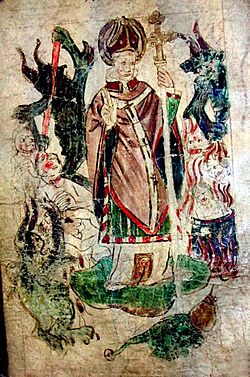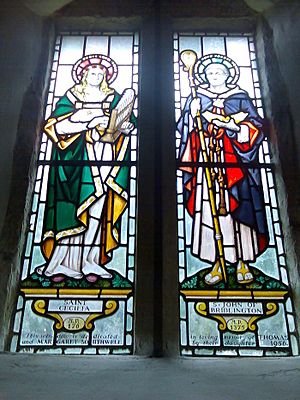John Twenge facts for kids
Quick facts for kids John Twenge(Saint John of Bridlington) |
|
|---|---|

John of Bridlington in a 15th-century manuscript illustration
|
|
| Born | 1320 Thwing, England |
| Died | 10 October 1379 |
| Venerated in | Roman Catholic Church |
| Canonized | 24 September 1401 by Pope Boniface IX |
| Feast | 21 October |
| Attributes | fish, book, crozier, fur almice; muzzled animal at his feet |
| Patronage | women in difficult labour; fishermen |
John Twenge (also known as Saint John of Bridlington) was an English saint who lived in the 1300s. He was born in 1320 and died in 1379. During his life, people believed he was very holy and could perform miracles. He was known for living a good life, being smart, and being kind. Saint John of Bridlington was the last English saint to be officially recognized by the Church before a big change called the English Reformation.
Contents
Life of Saint John
John Twenge was born in 1320 in a village called Thwing. This village is in Yorkshire, England, about nine miles from Bridlington. His family, the Twenges, were from Yorkshire.
John went to school in his village from the age of five. Later, he studied at Oxford University. After his studies, he joined a religious group called the Augustinian Canons Regular at Bridlington Priory. A priory is like a monastery.
John was humble and worked hard in his duties. He helped train new members and gave aid to the poor. He also preached and held other important roles. In 1346, he became a Canon of the Priory. He was chosen to be the Prior, or leader, in 1356. At first, John humbly said no. But after being chosen again in 1361, he accepted the role in January 1362. He served as Prior for 17 years until he passed away on October 10, 1379.
Miracles by Saint John
People believed that John Twenge had special powers and could perform miracles. One story says he changed water into wine.
Another time, five sailors from Hartlepool were caught in a terrible storm. Their ship was about to sink. They prayed to God and asked for help in the name of John of Bridlington. Suddenly, John himself appeared to them in his religious clothes. He guided them safely to shore. The sailors left their ship and walked to the Monastery. There, they thanked John in person for saving their lives.
There is also a story about a man named William Staunton. He visited a place called St Patrick's Purgatory. In his vision, Saint John of Bridlington guided him through the otherworld.
Death and Canonisation
After John's death, stories of his miracles spread quickly. People believed he could help them if they prayed to him.
In 1401, Pope Boniface IX officially declared John a saint. This process is called canonisation. This meant that John Twenge was recognized by the Roman Catholic Church as a saint.
During the English Reformation, the beautiful shrine built for Saint John was destroyed in 1537. This happened when King Henry VIII ordered many religious sites to be taken down. Today, only the main part of the church, called the nave, remains of Bridlington Priory. It was restored in 1857.
Veneration and Legacy
Saint John of Bridlington was admired for living a good life. He was also known for his knowledge and his quiet kindness. He was the last English saint to be canonized before the English Reformation.
King Henry V believed that Saint John of Bridlington helped him win the famous Battle of Agincourt. This was a big victory for England.
Today, women who are having a difficult time during childbirth sometimes pray to Saint John of Bridlington. He is considered their patron saint. He is also connected to the local fishing industry in Bridlington.
At All Saints Church in Thwing, there is a window that shows Saint John of Bridlington. In Bridlington, there is a street named St John Street after him. It connects the old part of town with the fishing area. At St Andrew's Church, Hempstead, Norfolk, there is a wooden panel showing John of Bridlington holding a fish. He is also shown wearing robes like a bishop, even though he was never a bishop.
See also
- Saint John Twenge, patron saint archive
 | William Lucy |
 | Charles Hayes |
 | Cleveland Robinson |


